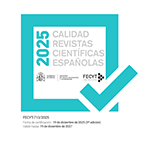Currency and politics: the Aristotelian inheritance in contractualism
Abstract
The objective of the present inquiry is to demonstrate whether the conceptualizations made regarding currency by contractarian philosophers Thomas Hobbes, John Locke and Montesquieu make them direct continuators of Aristotle’s work or if, on the contrary, they distance themselves. To this end, aspects of the monetary phenomenon such as its origin, nature or essence, function, teleology, and ethics are contrasted and analyzed. Thus, the analysis developed allows us to show that modern contractualism has been more than a simple and unique canon of common thought. This entails expanding knowledge regarding it because although the different processes of monetary conceptualization do present repetitive philosophical positions in some respects, the reflective categories used by each one allowed them to create internal coherence in their respective perspectives; such notions underpin them ideas of the deliberative capacity granted to collective enterprises to transform their contexts
Downloads
Article download
License
In order to support the global exchange of knowledge, the journal Iberian Journal of the History of Economic Thought is allowing unrestricted access to its content as from its publication in this electronic edition, and as such it is an open-access journal. The originals published in this journal are the property of the Complutense University of Madrid and any reproduction thereof in full or in part must cite the source. All content is distributed under a Creative Commons Attribution 4.0 use and distribution licence (CC BY 4.0). This circumstance must be expressly stated in these terms where necessary. You can view the summary and the complete legal text of the licence.
Iberian Journal of the History of Economic Thought is an open access journal that does not charge authors for article processing (submission, review or editing) or publication.









